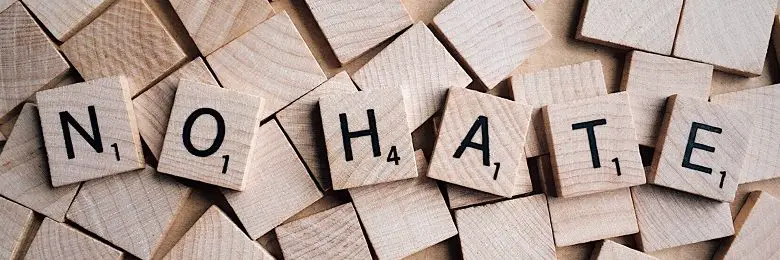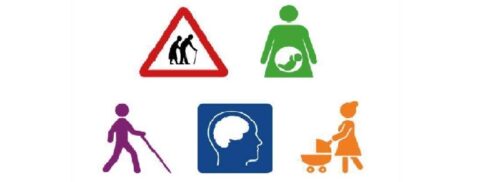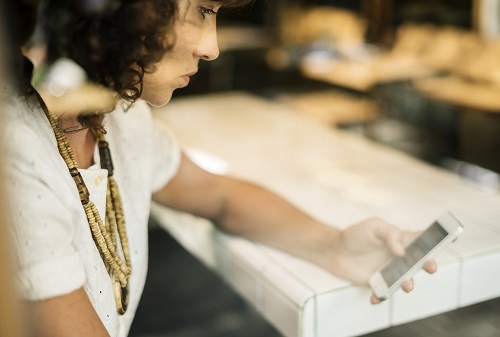
Disabled people experience more disability hate crime in public than online
A survey conducted by Disability Horizons and disability charity Leonard Cheshire has found disabled people have experienced more disability hate crime in public than online in the past three years.
More than half (53%) of the 196 people* who responded to our survey said they have experienced hate crime in a public place in the past three years, with 32 people seeing them happening during the coronavirus pandemic.
In contrast, only 43 people have been a victim of hate crime online, with 19 people reporting them occurring during the Covid-19 crisis.
Read on to find out more about the shocking statistics and read the real-life stories from people who have experienced it.
Disability hate crime in public

Of those who have been subject to disability hate crime in public in the last three years (105), 49% have experienced it between two to five times.
47% said they’ve experienced verbal abuse aimed directly at them, such as shouting and name-calling.
When asked about reporting incidences of disability hate crime in a public place:
- 56% didn’t report it
- 21% reported to staff at the public place
- 19% (20 people) reported to the police.
Inappropriate exposure at a wheelchair user
A wheelchair user was verbally victimised by teenagers at a bus station, which left them mentally traumatised:
“I went past some youths, in my powerchair, at a bus station. Suddenly one of them came running from behind me, stopped suddenly in front of me, dropped his trousers and his pants to expose himself.”
He (and his friends) laughed and he said something about me needing some of this while pointing to his genitals. He then pulled his clothing back up and ran off.
Although I wasn’t hurt, a few minutes later I started crying uncontrollably and several people came to comfort me. I couldn’t get the incident out of my mind for months.
At the time I hadn’t even given him a withering look, and I was so disappointed with myself for not taking any action at the time.”
Blue Badge holders judging others
Disability hate crime doesn’t just come from non-disabled people, but also other disabled people:
“I’ve been verbally attacked and my car banged on before I could even put my Blue Badge inside my window.
This happens frequently and is often by other disabled Blue Badge holders. Because I’m younger than some badge holders, I get targeted by older people.”
Lazy scrounger comments
One respondent witnessed offensive comments about disabled people from someone she knew while out at a bar:
“Once, the landlady and my former employer ranted on about two disabled friends of mine – one who has schizophrenia and was born with just one hand, and the other who has brain damage after a horrific car accident.
She said that they were lazy scroungers of the state for not working, all just three feet away from me.
I also can’t work because of my MS and mental health problems. It shocked me so much that I haven’t left my flat since that incident three years ago. ”
9 of the 105 people who have been victims of disability hate crime have experienced physical abuse, such as hitting and spitting.
Physical abuse on a pelican crossing
A woman who uses two crutches was physically and mentally traumatised after being attacked on a main road:
“My husband had taken me to the hairdressers in the city centre. Coming out, I had to cross the main road to return to the car park where my husband was waiting.
The pelican crossing was very busy, and there were buses and cars revving their engines. I started to make my way across the road when two young men started loudly making comments.
I tried to ignore it and kept my head down, but one said to the other, “The fat, ugly bitch on crutches is yours” and then pushed him hard into me.
I lost my balance and fell to the ground, my sticks out of my reach and the lights changed. They ran off and I panicked and grabbed about retrieving my sticks, other people just walking around me.
I shuffled on my bottom to the pavement and pulled myself up on the post of the pelican crossing. I was grazed and bleeding but worse still, I was completely traumatised.”
Disability hate crime in public during Covid-19

Only 32 people we surveyed said they’ve experienced disability hate crime in public during the coronavirus pandemic, with 14 saying it was specifically because of Covid-19. The majority of these incidents were related to the face mask exemptions.
Verbal abuse for removing face mask to lip read
Karolina Pakenaite, who has Usher syndrome, and her 16-year-old sister, Saule, were confronted by another passenger on a train after Saule removed her face mask so that her deaf-blind sister could lip read. Karolina told us:
“I am the girl on the news who got attacked on the train because I needed to enable my sister to lip read.”
Stopped by shop workers for not wearing a face mask
A customer with a health condition that causes breathing difficulties was stopped by shop staff for not wearing a face mask:
“I’ve been pointed at, talked about and even stopped by shop workers for not wearing a mask. I have acute asthma, bronchitis and allergies, including cardiopulmonary urticaria.”
Disabled person told to shield accused of being lazy
As well as being criticised for not wearing face masks, disabled people shielding have been accused of being lazy:
“I was told I should go out and get my own groceries instead of shielding even though I was told to do so. I was called a lazy, scrounging foreigner and that there was nothing wrong with me.”
You can read our full article about the abuse disabled people have been getting about the face mask exemptions, including from other disabled people.
Disability hate crime online

Out of the 43 people who have been victims of disability hate crime online, 22 have experienced it more than once but less than five times.
22 people have had a disability hate crime committed by a named stranger online.
Our stats also show that Facebook is the most common place for disability hate crime online, with 30 respondents saying they’ve been victimised on the social media platform and/or the messenger service.
Facebook user told they’d be better off dead
A member of a Facebook page was sharing the difficulties of their health condition when another user commented that they’d be better off dead:
“On Facebook a person was saying that what I was going through was all in my head and that if it was that bad I would have been better off not here as I don’t want to get better.
The person had been having a go at others on the page, so admin stepped in shut the post down and removed the person making the comments.”
Grandparent accused of lying about their disability
A Facebook user accused a grandparent of lying about their disability because they believed disabled people can’t travel abroad:
“I am proud to be a spoonie; a disabled person with a fluctuating condition” – this is on my Facebook page, in my open details and in my photos.
Someone I have never met took it upon themselves to tell me that I was lying about being disabled as I had shared my experiences of having taken a trip to Canada to visit my grandchildren.
They said that if I was really disabled It would be impossible for me to drive or to fly as disabled people are incapable of doing those activities.
I politely pointed out that lots of disabled people drive and travel all over the world, including mountain climbing. I cannot write his response to that, which was removed by Facebook within the hour, as it is just too disgusting for words.”
Blogger victim of hateful slurs online
A disability blogger was subject to offensive comments and hate speech on their online platform:
“I run a blog that tries to help young disabled people and someone started a hate campaign calling me “crippled bitch” and “retarded”.
It was also claimed that I should have been drowned at birth, or “killed for the betterment of society”. It lasted for a while as it took the site time to see that it as a hate crime despite the use of slurs and specific wording.”
Disability hate crime online during Covid-19
19 respondents have experienced hate crime online during the coronavirus pandemic, with 13 of them saying it happened because of Covid-19.

Saying thank you was met by hateful comments
A disabled person who received food parcels over lockdown simply wanted to say thank you but got a backlash of abuse online:
“It was on Facebook, actually a government page. I’d been receiving the Provisions Box during the lockdown and I just wanted to say thank you to the government and the British Taxpayers for this privilege.
After I’d posted a message of thanks I began receiving so many negative messages accusing me of being a lazy taker.
I posted a couple of lines about my personal disabilities and received the most hateful, nasty, upsetting messages, such as “I should be dead if I’m so disabled” and “people like me shouldn’t get free stuff”. They even accused me of being a “druggie” and worse.
I found it to be very hateful and extremely upsetting. I’m simply a retired NHS amputee who wanted to say thank you.”
Criticism over face mask exemptions
Two respondents told us how they’ve received online abuse for being exempt from wearing a face mask.
One person said: “Every single day I’m told that if I can’t wear a mask I should stay indoors, that Covid should have got me, that only those with underlying conditions die as if that justifies our higher death rates.”
Another person has found a creative way to tackle hateful comments online: “I’ve been trolled on Facebook groups, mainly due me being exempt from wearing a face mask.
Other people think people like me who are “unmasked” should not be allowed to do what everyone else can do now. I have set up a self-help group in response rather than complain.”
Reports of violent disability hate crime continue to rise
In addition to this survey with Disability Horizons, Leonard Cheshire also conducted research with fellow charity United Response.
They found that reports of disability hate crime are up 12% across 36 regions in England and Wales in 2019/20 but only 1.6% of cases resulted in police charging the perpetrators.
You can find out more about this research by reading Leonard Cheshire’s article: Reports of violent disability hate crime continue to rise.
*The survey was conducted in August and September 2020. We surveyed 196 UK residents who consider themselves to be disabled or have a long-term health condition. This data is not representative of a wider population, nor is it weighted.
By Disability Horizons
More on Disability Horizons…